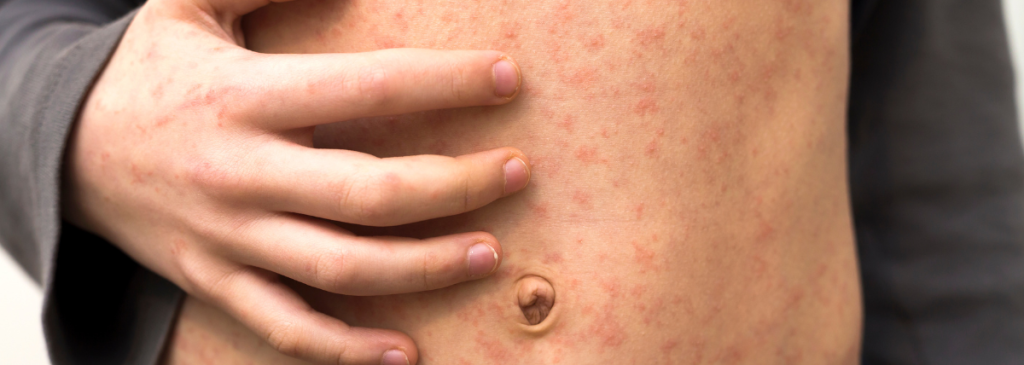- Home
- Health Topics
- Measles
Measles

Click the red button above to begin the assessment
Measles is a highly contagious disease caused by a virus. It spreads easily when an infected person breathes, coughs, or sneezes. It can cause severe disease, complications, and even death.
Measles can affect anyone but is most common in children. It infects the respiratory tract and then spreads throughout the body.
Cases of measles have been identified in the region. The following chart lists potential exposure locations within the community. Individuals who believe they have been exposed are advised to monitor for symptoms for a period of 21 days. Exposure locations will be added and removed on an ongoing basis as case details evolve.
Measles Cases in Ontario
Epidemiology of measles outbreak cases in Ontario in 2024 and 2025, as well as trends over time for 2013-2024.
Read the Public Health Ontario surveillance report here
Prevention/Vaccine Eligibility
To prevent measles, get your child immunized with a measles containing vaccine (MMR or MMRV). All Ontarians should ensure they are fully vaccinated against measles, especially before travelling.
As of February 10, 2025, those who live, play, travel to, worship or otherwise, in the Grand Erie Public Health (GEPH) and Southwestern Public Health (SWPH) regions:
- Expanded eligibility for infants 6 months to 11 months of age
- Accelerated schedule for second doses in children under 4 years of age
- Second dose for adults born in and after 1970
EXPANDED ELIGIBILITY FOR INFANTS 6 MONTHS TO 11 MONTHS:
- To create additional protection for this highly vulnerable age group, an additional publicly funded dose of measles containing vaccine can now be provided to infants 6 months to 11 months of age.
- The use of MMR vaccine down to 6 months of age for infants at risk of measles exposure (in the setting of an outbreak-affected area or travel) is a long-standing off-label vaccine recommendation from the National Advisory Council on Immunization (NACI).
- Priorix® or MMRII® may be used interchangeably and are both safe to provide for 6mo and older.
- Two additional doses of measles containing vaccine must be administered after 12 months of age (and at least 28 days after the previous dose) to ensure long-lasting immunity to measles.
ACCELERATED SCHEDULE FOR SECOND DOSES:
- To increase immunization coverage among children and prevent complications from measles infection that are more common under the age of 5 years, the second dose of the measles-containing vaccine scheduled at 4-6 years of age should instead be provided as early as 28 days from the previous dose.
- At an interval of 28 days or beyond, the second dose is considered valid under the Immunization of School Pupils Act and effective to provide long-lasting immunity. An additional dose of measles-containing vaccine at 4-6 years would not be required.
SECOND DOSE FOR ADULTS BORN IN AND AFTER 1970:
- To further mitigate the risk of ongoing transmission in the community, adults born in and after 1970 with only one dose of measles-containing vaccine should be offered a second dose.
- Individuals born prior to 1970 in Canada are likely to have immunity as the result of being exposed to measles through natural infection.
THOSE BORN PRIOR TO 1970:
Individuals born prior to 1970 in Canada are likely to have immunity as the result of being exposed to measles through natural infection.
- Eligible for two doses if a health care worker or military personnel.
For more information on the Measles Vaccine, please visit our Immunizations and Vaccine Page.
For questions and concerns about pregnancy or childhood immunizations, please visit SickKids Immunization InfoLine.
Signs and Symptoms
- Symptoms occur within 7-21 days after a person has been exposed.
- The first symptoms are a high fever, aches and pains, runny nose, red swollen eyes and cough.
- Koplik’s spots, which are small bluish white spots, may also be seen inside the mouth.
- Four days into the fever, all these symptoms will be worse and a rash appears with bright red, raised, large spots.
- The rash starts on the face then spreads down over the body to the arms and legs. The rash begins to fade after about a week.
- The total illness lasts on average 7-14 days.
Spread
- A person with measles is contagious from four days before to four days after the rash appears.
- Measles is spread easily from person to person – over 90% of persons exposed at home to a child with measles will catch it.
- Measles is an airborne disease that is spread simply by breathing in air that contains the measles virus. Measles virus can live in the air for up to two hours where a person has coughed or sneezed.
- It may also be spread by direct contact with nose or throat droplets of infected person.
What to Do if You Have Been Exposed to Measles
GEPH advises anyone who believes they may have been exposed to the measles virus to do the following:
1. Check vaccination records to ensure protection from Measles.
Measles is preventable by vaccination. Individuals should check their vaccination records to confirm they and their family members are up to date with their measles vaccinations.
In Ontario, the current immunization schedule includes two doses of measles containing vaccine before the age of 7 – the MMR vaccine (measles, mumps, rubella) is administered at 12 months of age, followed by the MMRV vaccine (which has the addition of varicella) between 4 to 6 years of age. Those who are unsure of their vaccination status are asked to check with their health care provider.
Generally, those born before 1970 are considered immune due to the prevalence of the infection at that time. Anyone born in or after 1970 who has not received two doses of a measles containing vaccine (at least four weeks apart) or has not had measles before is at risk of infection if exposed. Within 72 hours of exposure, administration of the MMR vaccine may reduce the risk of infection in these individuals.
2. Vulnerable individuals with a weakened immune system should contact their health care provider.
Susceptible individuals at higher risk may be eligible to receive immunoglobulin within six days of exposure. This includes:
- infants less than 12 months of age
- pregnant individuals who have not received 2 doses of a measles-containing vaccine
- individuals with compromised immune system
Immunoglobulin may prevent or reduce the severity of infection. These individuals are encouraged to contact their health care provider by phone to discuss treatment options.
3. Monitor for symptoms of measles for 21 days after exposure.
Symptoms can include fever, runny nose, cough, red eyes, a red rash that begins on the face and spreads down the body, and small blue-white spots (Koplik spots) that can appear on the inside of the mouth and throat. Monitor for symptoms even if up to date with measles vaccinations.
Anyone experiencing symptoms should contact their health care provider as soon as possible, or if unavailable, contact GEPH infectious disease team:
- Brantford-Brant: 519-753-4937 ext. 454
- Haldimand-Norfolk: 519-426-6170 or 905-318-6623
Before visiting a clinic or hospital, call ahead to inform them of your symptoms and potential exposure to measles. This allows the facility to prepare and helps prevent the spread of the virus.
Additionally, wear a medical-grade mask when attending the clinic or hospital.
Diagnosis and Treatment
- Measles is diagnosed by laboratory tests, including a urine, blood, or nose/throat test.
- There is no specific treatment for measles; most people recover at home.
- Severe infections may require hospitalization.
- Close contacts of an individual with measles should have their immunization status assessed.
Complications
- It is often complicated by diarrhea, ear infection, croup (a condition resulting from blocked airways), pneumonia, or encephalitis (brain swelling).
- Measles can also cause death.
- Measles in pregnancy can lead to premature delivery and miscarriage.
What to Do if You Have Measles
- Anyone with measles must stay away from daycare, school, and work for at least 4 days after the appearance of the rash.
- Measles is a reportable disease and must be reported to the Local Medical Officer of Health under the Health Protection and Promotion Act.
- To avoid further spread of the measles virus, isolate at home.
- Measles is contagious from four days before to four days after the rash appears.
- It is especially important to avoid contact with infants, pregnant people, and immunocompromised people and any high-risk settings including health care, childcare, and school.
- If you have measles symptoms or have been exposed to measles and are not vaccinated, please avoid health care settings including hospitals unless you require medical care for worsening or severe symptoms.
- If you require medical care, do not delay but call ahead to inform them of your symptoms so they can prepare for your arrival and take appropriate precautions to prevent others from getting sick too.
- Wear a well-fitting, medical grade mask (e.g., surgical mask, N95) when getting medical assessment.
Report your immunizations

Parents can report their child’s immunization by mail, phone, email, fax, or by using the online reporting system.
